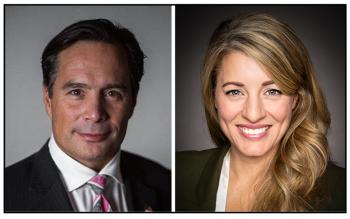Image Caption
Summary
Local Journalism Initiative Reporter
Windspeaker.com
The Indigenous tourism industry across Canada will receive a significant boost from the federal government.
At a news conference on Monday in Hillier, Ont., Mélanie Joly, the minister of Economic Development and Official Languages, announced the Canadian government is launching a new $500 million Tourism Relief Fund.
Joly said a minimum of 10 per cent of this fund, $50 million, will be allocated to Indigenous tourism business operators.
“It is an extremely important part of the Indigenous economic development approach that we support our Indigenous tourism operators,” Joly said. “We’ve heard their call for help and that’s exactly why we wanted to make sure that there was an Indigenous lens given to this new funding.”
Last year the federal government had provided the Indigenous Tourism Association of Canada (ITAC) with $16 million in funding.
ITAC officials then distributed up to $25,000 grants to 683 Indigenous tourism businesses throughout the country.
ITAC was seeking slightly more than $68 million in funding as part of its four-year pandemic recovery strategy, including $18.3 million in federal assistance in 2021.
But when the federal budget was released in April, Indigenous Services Canada recommended just $2.4 million be allocated to ITAC this year.
As a result, when ITAC officials discovered the amount of money they were scheduled to receive this year they were not only heartbroken but also declared there was a strong possibility the association would become insolvent by the end of May.
ITAC reps continued to lobby federal officials for additional funding in recent months.
ITAC president and CEO Keith Henry was reluctant to comment on Monday’s press conference until he had additional details.
ITAC then put out a news release on Tuesday afternoon.
“The Government of Canada demonstrated their commitment to the importance of investing in Indigenous tourism in Canada,” Henry said. “This is a very significant direct commitment for Indigenous tourism businesses, Indigenous tourism provincial/territorial partners and the Indigenous Tourism Association of Canada. We are working out the two-year implementation details and will be moving quickly to support our Indigenous tourism industry recover and rebuild.”
Joly realizes how devastating the pandemic has been for those in the tourism industry.
“Obviously the tourism sector has been extremely hard hit,” she said. “They were the first one to be hit and still one of the most hardest hit.”
Restrictions and lengthy lockdowns across the country have resulted in massive financial losses to those in the industry.
“We’ve asked Canadians to stay home to make sure that we would stop the spread of the virus,” Joly said. “And obviously this has had a very devastating impact on the tourism sector.”
Joly added federal officials have been doing their best to support Canada’s entire tourism industry since the pandemic started last year.
She said the federal government has already provided $15.4 billion to tourism operators across the country via wage subsidies, rent relief programs and other tools at their disposal.
“What we’ve heard from them is that there is still more work to be done,” Joly said. “They’ve shown incredible resilience and creativity but still we need to be there. And that’s exactly why we are here. And we can say that we’ve got their back.”
Joly, who was making her first public appearance outside of her home province of Quebec at Monday’s press conference, said the new Tourism Relief Fund will provide numerous benefits.
“It will be created to make sure businesses can create new experiences or enhance existing experiences,” she said. “And it will help in that sense (to) position Canada as a destination of choice when borders reopen.”
Joly said federal officials are fully aware of the contributions Indigenous business operators play in the country’s tourism industry.
“We know that Indigenous tourism operators were doing great just before the pandemic,” she said. “Of all the tourism businesses, it was Indigenous tourism businesses that were really growing the fastest, just before the pandemic. And in that sense, we want to make sure that we’re there for them.”
Joly added the possibility exists that those in the Indigenous tourism industry could indeed be sharing more than the amount of funding announced on Monday.
“I think ($50 million is) a good start in the sense that it’s a minimum and if the ask is higher, we will adapt,” she said.
Pam Damoff, the Parliamentary Secretary to the Minister of Indigenous Services, also was pleased the new fund will set aside portions for Indigenous tourism operators.
“The Indigenous tourism industry supports the overall Indigenous economy and creates jobs, supports families, and allows travelers to experience the vibrant and diverse communities and cultures of Indigenous peoples,” she said. “The Tourism Relief Fund will provide needed support to Indigenous tourism businesses all across the country in order for the industry to turn the page from crisis to recovery and build back better.”
Local Journalism Initiative Reporters are supported by a financial contribution made by the Government of Canada.

